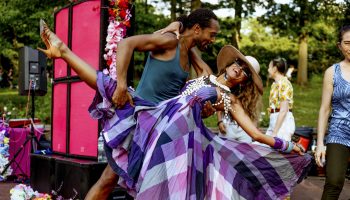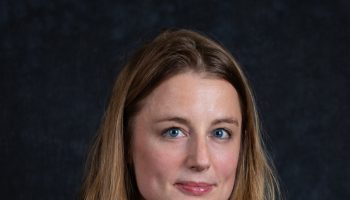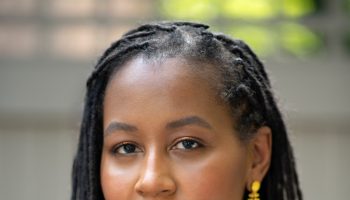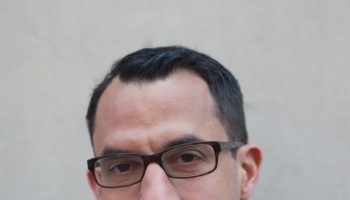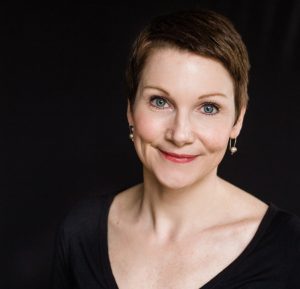
Maggie Smith’s greatest professional success hinges on a cycle of grief.
Her poem “Good Bones,” which Public Radio International proclaimed the “Official Poem of 2016,” went viral during the tumultuous year — a year in which 49 people in the Pulse nightclub shooting were murdered, Donald Trump was elected president of the United States and British politician Jo Cox was assassinated.
As news of fresh tragedy and growing uncertainty assaulted headlines, Smith’s description of living in a world that seems “at least / half terrible,” moved readers to share the poem on social media, giving “Good Bones” a life of its own. Like clockwork, it reappears on timelines when world anxiety is at its peak.
Smith wrote the poem a couple years before the events that buoyed “Good Bones” to its viral fame, she told Katherine Gibbel in a 2017 interview for The Rumpus.
“It’s a strange thing, because it’s a blessing and a curse,” Smith told The Rumpus. “But professionally, ‘Good Bones’ is the best thing that happened to me, of course. And the best thing that happened to me because of bad things happening to other people. And that’s something that I struggle with.”
As the Week Three poet-in-residence at the Writers’ Center, Smith will give her Brown Bag lecture “Make It New: Writing Poems as (Re)Discovery” at 12:15 p.m. Tuesday, July 9 on the porch of the Literary Arts Center at Alumni Hall. The subject, Smith said, “absolutely applies” to both her body of work and what she hopes to accomplish in her Chautauqua workshop.
“Without giving too much away, (the lecture is) really about re-vision: writing and reading poems as a way of making a familiar world — familiar landscapes, experiences, relationships — new again,” she said.
It might be helpful, in other words, to experience the world through a child’s eyes.
Smith is the author of five books of poetry, including Disasterology, winner of the 2013 Dream Horse Press Poetry Chapbook Prize, and The Well Speaks of Its Own Poison, the gold medal winner for poetry at the 2016 Independent Publisher Book Awards. A lifetime Ohioan, she is an editor-at-large for The Kenyon Review, and has received six Individual Excellence Awards from the Ohio Arts Council. Her 2010 book, The List of Dangers, published by Kent State University Press, won the Wick Poetry Series Chapbook Competition. (Traveling Stanzas, the interactive exhibit that occupies the Poetry Makerspace in the Hultquist Center, is a product of Kent State University’s Wick Poetry Center.)
“Good Bones,” the titular poem of her most recent collection, is a parent’s confession, an admission of an almost-hopeless feeling hidden away from the perked ears of her children.
“Life is short and the world / is at least half terrible, and for every kind / stranger, there is one who would break you, / though I keep this from my children. I am trying / to sell them the world,” the poem reads.
As a whole, the book is full of Smith’s children, like the poem “What I Carried,” in which an “I” character “(carries her) fear of the world” in a terrifying and unwieldy attempt to protect the innocent; or “Parachute,” in which a daughter asks if the narrator knows anyone who “got dead in a fire.”
“I think I’m writing better poems as a mother than I wrote before — though I certainly have less time in which to write them,” Smith said. “Part of this, of course, is that as we get older, we grow in our craft, whether we have children or not. But my children help me see the old, familiar world anew — and poems are good places to let my mind chew on the issues I’m grappling with as a parent.”
Busy with teaching obligations, freelance deadlines and her two kids, Smith’s writing process is as structured as wrangling for a piece of paper “as soon as (an idea) arrives.” When writing prose, she composes on a computer, hunting for the correct language that will give shape to an already-held idea. When writing poetry, the process is usually the opposite.
“My process with poetry is pretty piecemeal — I jot bits down longhand and eventually type it up once a poem begins to take shape,” Smith said. “The language comes first, and I follow it to see where it might lead idea-wise.”
Listing Ada Limón, Victoria Chang and Charles Simic as a few of her favorites, Smith is “inspired by poets daily.” It’s not just the poet’s literary oeuvre, “but also … their warmth and generosity, their friendship and the work so many poets do inside of and outside of the literary community.”
If “Good Bones” was the poem that provided glimmers of light in 2016, what poem does Smith turn to in 2019?
“I couldn’t possibly name one, but two that are getting me through are ‘The Sun Got All Over Everything’ by Gabrielle Calvocoressi, and a new poem by David Baker, just published in New England Review, ‘Hold Hands,’ ” Smith said. “The current moment is a difficult one — and therefore we need poems more than ever.”

